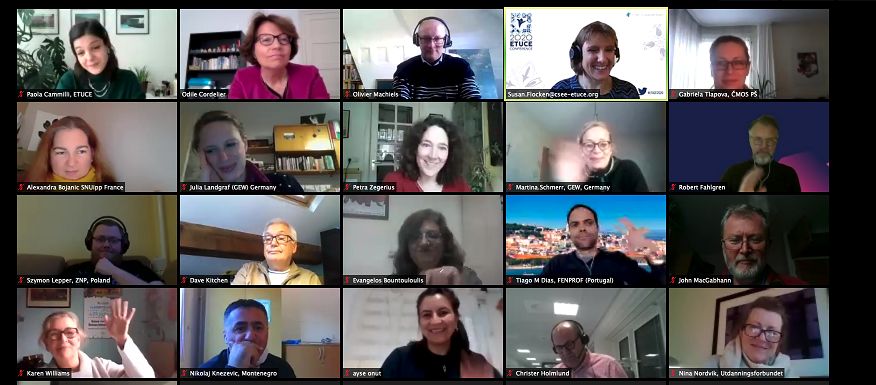
Digitalisation in Education: ETUCE holds webinar on the challenges and opportunities of digitalisation for education trade unions
In light of the upcoming ETUCE Conference 2020 on Campaigning to Enhance the Teaching Profession for Solidarity, Equality, Democracy and Sustainability, ETUCE is organising a series of pre-Conference webinars.
On 18 November, ETUCE held a webinar on the challenges and opportunities of digitalisation for education trade unions. ETUCE members from across Europe joined to exchange viewpoints and experiences and share good practices.

Today, the digital transition stands as one of the single biggest changes and challenges for modern societies and profoundly impacts the education sector. This digital transition can be a source of opportunity for education trade unions, fostering more inclusive learning environments and better tailor teaching to students’ individual needs.
Yet, with the digitalisation of education numerous challenges arise for education trade unions, having regard to education personnel's work-life balance, privacy, health and safety and professional autonomy. Moreover, education technology is a market worth $ 187bn, with 15% growth rate, and education is considered by businesses as one of the largest sector for consolidated market opportunities in the world. This makes it a prime target for private interests pursuing an unregulated introduction of technologies, such as Artificial Intelligence (AI) or Learning Analytics.
The temporary closures of schools due to the COVID-19 pandemic has advanced this digital shift by years if not decades. As school systems had to rapidly switch online, participants at the webinar highlighted the need to ensure that all issues regarding technological development, Artificial Intelligence, learning analytics, data mining and other new digital content that supports education are developed in partnership with teachers, support their professional autonomy and benefit all students, through effective social dialogue. This crisis highlighted the urgent need to increase digital skills and competence levels across Europe and to tackle the digital divide to ensure that all students can exercise their right to quality education.
Closing the webinar, ETUCE European Director Susan Flocken said: “ Digital transformations are shaping the world of work of teachers and other education personnel and there is no doubt this will continue to be a priority for ETUCE work in the next four years. ETUCE and its member organisations affirm their commitment to shape a digital future that links digital technologies with effective access to quality education for all students while at the same time protecting education personnel’s work-life balance, privacy, and safety.”
Learn more about the ETUCE Conference here.
For more information on the workshop: